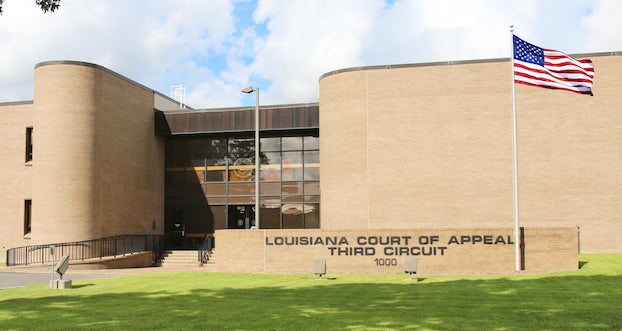Local veteran talks about the aftermath of war
Published 9:09 am Sunday, November 24, 2013
Gable Darbonne’s voice trembles as he recalls an incident in late August 2003 during his platoon’s first major patrolling raid at a home in Mahmoudiyah, Iraq, that left four Army soldiers seriously injured.
Darbonne was driving one of three Humvees roaming around the city while the raids were taking place and acting as a potential medevac units for injured soldiers.
An Iraqi directed the soldiers to the home, saying, “Enemy.” During the raid, two Iraqis began firing shots. One of the rounds ignited a propane tank, burning several soldiers.
“We take the wounded soldiers back to the base; there was the smell of burning flesh,” said Darbonne, 31. “I was so mad. I prayed to God and said, ‘Let it be me next time.’ I don’t want to see that happen anymore.”
That experience and others during his time in the military still haunt him a decade later, causing him to suffer from anxiety, insomnia and depression. Several doctors told him the symptoms are associated with post-traumatic stress disorder, or PTSD, and that he should seek treatment.
This summer, Darbonne spent two months at the Central Arkansas Veterans Healthcare System in Little Rock to learn about PTSD and about ways to cope with the symptoms. He and three other veterans will be featured in a news segment at 6 p.m. today on the CBS television newsmagazine “60 Minutes.”
“I’m tired of feeling this way,” he said. “I’m putting myself out there to help others that became lost like me. That’s the main reason for this.”
Background
Growing up, Darbonne said, he never wanted to join the military even though his older brother, Emerson, served in the Navy from 1997 to 2002. But that outlook changed after he witnessed the Sept. 11, 2001, terrorist attacks. Darbonne, then 19, was studying theater at McNeese State University.
The day before the attacks, Darbonne said an Army recruiter called him and asked if he was interested in joining the military.
“I told him the only way I would join is if my country was ever in distress,” he said.
On the morning of Sept. 11, Darbonne said he was preparing for a job interview and saw a plane crash into one of the World Trade Center towers. During the interview, he heard that another plane had crashed into the other tower, followed by another plane crashing into the Pentagon.
“We quit the interview and watched it on TV,” he said. “We watched the World Trade Centers go down. It was a surreal experience.”
Less than a week after the attacks, Darbonne said, he decided to leave school and join the military. He went to the Army recruiting office and spoke with the same recruiting officer who spoke with him the day before the attacks.
“I told him there’s something forcing me into this,” Darbonne said. “My intention was to take that risk and defend our country when other people couldn’t.”
Despite pleas from his parents to stay home, Darbonne said he was committed to serving. In late October, he headed to Fort Benning, Ga., for basic training and airborne school.
Afghanistan
After finishing basic training in April 2002, Darbonne was sent to Fort Bragg, N.C., to train as an airborne infantryman with the Army’s 82nd Airborne Division.
He said he soon heard rumors about a battalion being deployed to Afghanistan. He asked a higher-ranking official if he could deploy, but was told he needed more training.
“I kept on pressuring him until he made me a rifleman in the battalion,” Darbonne said.
Darbonne was assigned to the 3rd Battalion, 505th Parachute Infantry Regiment, and his platoon arrived in Kandahar, Afghanistan, in June.
In late August, the platoon spent seven days on a mission known as Operation Mountain Sweep, taking them through more than 150 miles of air mobile operations throughout Afghanistan. One night during the mission, Darbonne said he awoke to the sound of loud explosions and the sight of shrapnel flying around in the distance. He said it was the first time he felt scared during combat.
“We got hit up by these rockets,” he said. “Everybody was yelling, and our mortar team launched 44 rounds of mortar shells at the horizon in front of us.”
After the action ceased, Darbonne said, “there was an eeriness in the air.”
“It was the first night I had a nightmare,” he said. “I never had that feeling before. You can never unsee that.”
Darbonne said the platoon went to the city of Khost, Afghanistan, where he spent three months doing combat operations. The platoon returned to Fort Bragg in December 2002.
While he was shaken up after seeing explosions for the first time, he said the feeling of fear and anxiety did not last. “That youth (and) invincible feeling was still there, where I felt I could do anything,” Darbonne said.
Iraq
Darbonne was at Fort Bragg when the invasion of Iraq began in March 2003. When President George W. Bush announced in May that major combat operations had ended, Darbonne said he thought he would not be deployed.
But Darbonne said he soon began hearing rumors that the conflict in Iraq was far from finished. Training exercises were altered, including a jump in an urban environment where people were dressed in Arab-style clothing.
“I knew something was going on,” he said.
Darbonne received orders in late July that he would deploy to Iraq in September, but the platoon was rapidly deployed to Baghdad a month early.
“I was excited to go, but you could see some guys were uneasy about it,” he said.
Darbonne was sent to Mahmoudiyah, a city south of Baghdad. His platoon was stationed in an old chicken processing plant.
“It was very post-apocalyptic,” he said. “Every time you would walk outside, you heard gunshots or explosions in the distance.”
Darbonne said he encountered a near firefight when he and another soldier found four armed Iraqis whom they didn’t know were Iraqi police.
“It was a standoff,” he said. “You’re pointing a loaded weapon at someone, and both groups are yelling a different language. It was the longest 10-15 seconds of your life.”
Darbonne said he felt tremendous guilt after the firefight that left four soldiers injured. He said he and other soldiers coped the only way they knew how — telling jokes.
“You can’t explain how you feel,” he said. “We coped like children, because that’s all we knew before.”
Coming home
Darbonne was honorably discharged as an specialist in August 2004 and moved to Carlsbad, Calif., in September. He spent several months with a friend who served with him Afghanistan. “Things were all right when I got home,” he said. “I just relaxed. I needed to find that clarity.”
During his downtime, he said, memories from military life began to surface. “I would hurry up and cancel those thoughts out,” Darbonne said.
He returned to Lake Charles in March 2005 and began taking classes at McNeese. He tried to adjust to normal life and reconnect with old friends, but said he felt “very misplaced.”
“When I talked about things, nobody would really listen,” Darbonne said. “I started missing my buddies I served with. I was wanting to reach out for that connection.”
Behavior changes
Around 2007, Darbonne said he began to notice a dramatic change in his behavior and attitude. He said he couldn’t avoid thinking about past experiences and began battling anxiety. He coped by drinking heavily. “It was a rough time,” he said. “You know deep down inside that something’s wrong, (but) you don’t want to admit it.”
Darbonne said he relied on the soldiers who served with him to deal with bad memories. “I would call my Army buddies and would lean on them,” he said. “We were all in the same boat.”
Darbonne began working in law enforcement in 2008, and was initially very motivated. But the next few years saw his emotions and anxiety worsen. He said he became isolated and would not leave his house at times.
“It was too hard to go outside and get food sometimes,” he said. “I couldn’t mow my lawn anymore. I wouldn’t take phone calls, depending on what mood I was in.”
At the insistence of a friend, Darbonne said he visited a social worker in 2010 to discuss his problem. But he said he only went once every six months because the pain “was too real” to confront.
In January 2011, Darbonne visited the VA clinic in Alexandria, and a doctor first told him he had PTSD. He said he was in denial.
“I didn’t want to address the problem,” he said. “I told myself they are just memories and they are not going to affect me. It’s probably just a bad stint of pure depression, or something else.”
Treatment
Earlier this year, he said two co-workers confronted him on his struggle with PTSD. “They said, ‘You’re not there anymore,’ and I knew I wasn’t,” he said. “They wanted me to be selfish for once, and they supported me.”
Darbonne said he volunteered to attend the Central Arkansas Veterans Healthcare System for two months. The session included classes on dealing with things that may trigger anxiety, depression, nightmares or other PTSD symptoms. Other courses dealt with relationships and transitions.
Participants also go through “prolonged exposure” therapy, recalling traumatic experiences several times a day until those memories lose their strength. Darbonne said he realized how raw his emotions were when he was sober.
“I was a wreck for the first week,” he said. “I could actually feel the tears, the heartache and the emptiness. The staff was so caring, and they took their time with us.”
Over time, Darbonne said, he bonded with other veterans, including some from the Vietnam and Gulf wars. “It was all the same experience, just a different era,” he said. “The fear was the same. Combat is combat.”
After graduating from treatment July 5, Darbonne said he was well during his first two weeks at home. But he said he still has rough days. “I’m aware now of what’s wrong,” he said. “But this is not a night-and-day issue. I do feel like an infant trying to crawl to get on my feet again.”
While he tries to manage the symptoms associated with PTSD, Darbonne said he does not blame the Army for what he has experienced in the years after his service. “I just don’t think the Army was ready to deal with that,” he said. “I don’t think anyone thought the war was going to last that long.”
Darbonne said he continued with prolonged exposure therapy at the VA clinic in Alexandria once a week for the last three months. He now visits the VA clinic in Jennings. “You have to confront the madness that you’re living in,” he said. “It’s a very hard beginning, but it’s a beginning for me.”
Gable Darbonne. (Special to the American Press)





